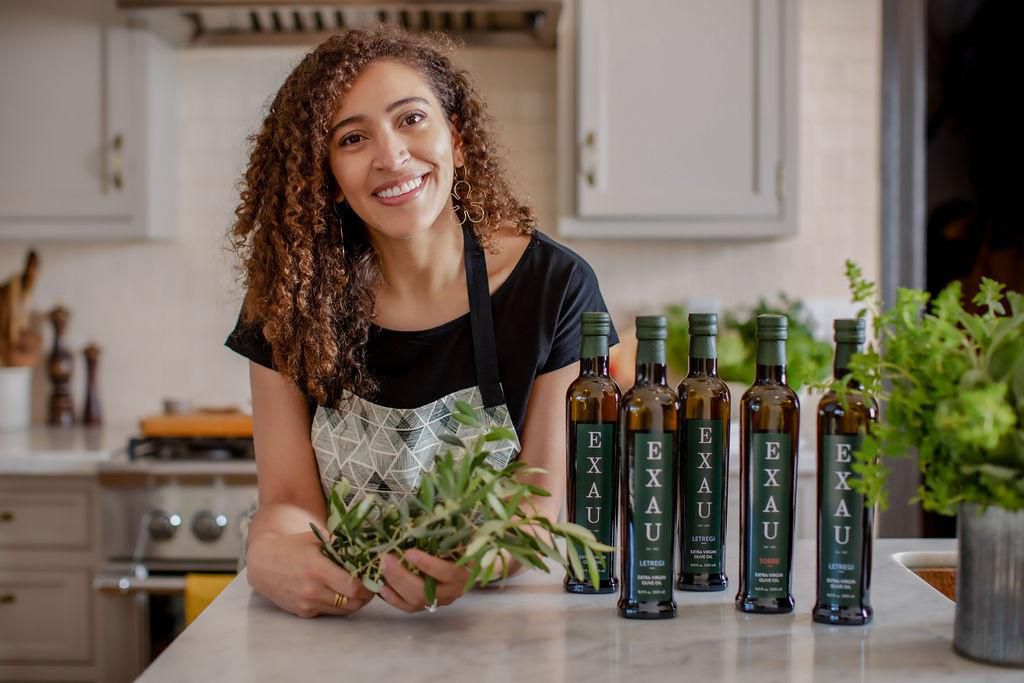
Skyler Mapes with her olive oil EXAU.
Madelene Farin
Skyler Mapes talks to me as she waters her herbs from her home in Le Castella, Calabria, her husband Giuseppe Morisani’s hometown. The sea glimmers in the distance from the sun warming the land, “we are right on the water and just absorbing the sun” and so are their olive trees.
Mapes entered the olive oil industry in 2017 with her husband to found their olive oil company EXAU, named after the Ancient Roman phrase, Ex Albis Ulivis, used to describe the very best olive oil.

Skyler Mapes and Giuseppe Morisani’s olive trees during harvest.
Skyler Mapes
Le Castella is a coastal town on the Ionian sea, a prime location that allows for the local olive trees to produce optimal flavor profiles that are fruity, herbaceous with notes of bitter almond. Mapes and Morisani cultivate Carolea, Coratina, Nocellara del Belice, Pendolino, and Leccino varieties from the family estate of about 500 trees, many of which are over 100 years old and have been planted over three generations.
Mapes is one of the few Black women that runs her own olive oil company, “I think I am the only Black woman in Italy, but there is a distinct difference between owning a brand, farming, and producing. It’s a whole other thing when you own and do all three.”
EXAU is a young company, but in a short amount of time, they were chosen as one of Oprah’s Favorite Things, which catapulted their notoriety. “Of course it’s great exposure and sales are insane. It is challenging for a small business to meet inventory updates because she is Oprah.”
Meeting the new demands and scaling up quickly isn’t easy though, “I had to say, Skyler, you have limits, the amount of product you can import and have has constraints. It was a way to learn our limits and how much you can grow in a given time.”
Yet, despite the overwhelming complexities of 2020, for the owners of EXAU, it’s been a year to grow, “the choice to expand now is also because of Oprah. It’s a bragging right to have for the rest of your life” says Mapes.
Even with the increased demand that the Oprah effect brought to EXAU, the ethical practices that don’t always blend with sudden fast business growth will always reign supreme for Mapes. “We don’t do high intensive farming. Today, in some countries, intensive olive tree farming has become mainstream since it presents a solution to reduce production costs. In general, depending on the variety, a plant treated under super-intensive farming practices can last from 10 to 15 years, drastically cutting the life of an olive tree.”

Skyler Mapes and Giuseppe Morisani in the olive groves of the family estate.
Skyler Mapes
The vision Mapes has for her company however is long term, “multigenerational olive oil is multigenerational wealth. It takes an olive tree 7 years for their first harvest, a small first harvest, and it takes 15 years for a full harvest. I know it’s not going to allow me to have more business tomorrow but this isn’t a fast business.” This is in part why the olive oil industry is difficult to break into and why so many olive oil companies are still family-owned and can be passed down from one generation to the next.
This year they expect to produce 10,000 bottles.
According to CBI, Italy is the second-largest olive oil exporter in the world. In 2019, the country exported 338 thousand tonnes of olive oil. Yet, due to marketing, often some regions are better known to Americans as olive oil country, but the reality is that the majority of olive oil comes from the south.
According to the USDA Foreign Agricultural Service, 82% of Italian olive oil is made in Southern Italy. 68% of olive oil is made in Calabria and Puglia. The remainder of production is in the regions of Sicily (8%), Campania (6%), Abruzzo (4%), Lazio (4%), Tuscany (3%), and Umbria (2%). However, oil from Calabria is not often labeled as such since the region doesn’t have the marketing and luxury name branding around it like other regions. “It got left behind,” says Mapes.
“We could have sold out easily and taken a million-dollar investment. We want to grow, just not in that way. There is an aspect of multigenerational wealth here. Giuseppe’s grandfather planted trees, his father planted trees and this will be for our children. I have a responsibility to EXAU and Calabria. This could not have happened for me in California and I love the Bay Area, but what is being done there must change.”

Skyler Mapes and Giuseppe Morisani showcasing their olive oil.
Skyler Mapes
Mapes, an Oakland native, said the California olive oil industry is riddled with “gatekeepers”. “It’s old and very white, there are a lot of women, actually there is a higher percentage of women than you would expect, but you have gatekeepers of the industry, even getting into a grocery store is complicated, there are many egos and they only want California products. But California only has 75 varietals; here in Italy there are over 650.”
Varietals are the key to achieving different flavor profiles, meaning that each olive oil made from a specific or a mix of varietals is unique and can be better used for specific dishes or cooking methods. Olive oil from Abruzzo for instance, which has different geography to Calabria, does not necessarily compete since the flavors are so unique to one another, let alone other countries. Mapes says that “Calabrian olive oil companies are not the competition either since the region is so severely underrepresented within the industry”.
“When we do this very heavy gatekeeping, you don’t allow diversity in the industry, I don’t think you should have geographic limitations.”




